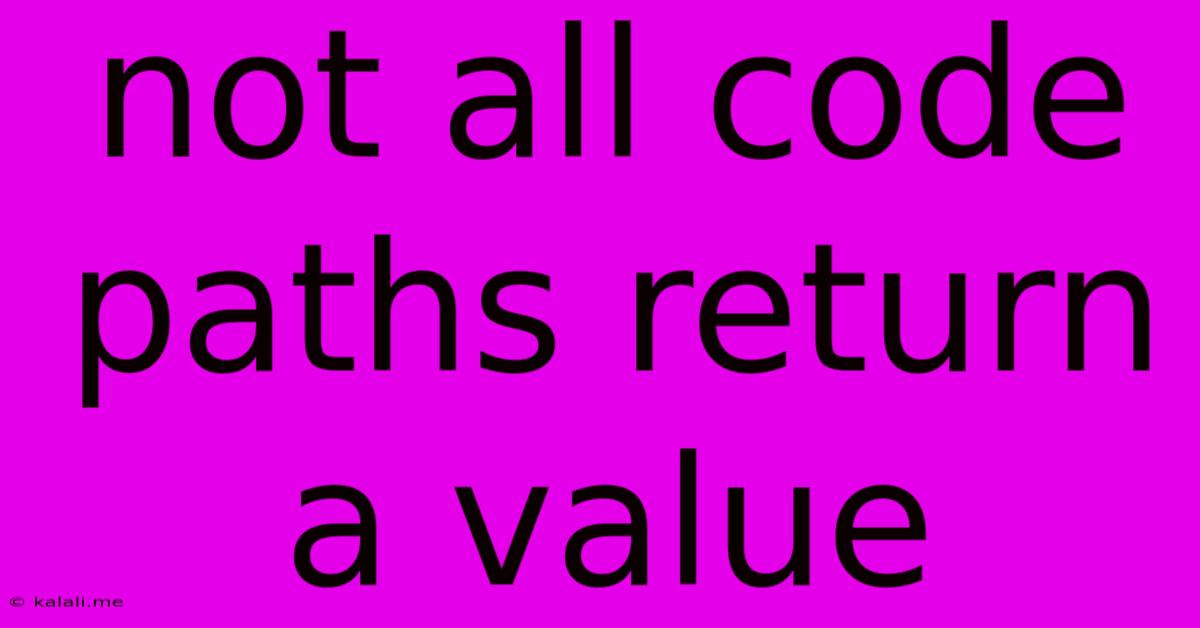Not All Code Paths Return A Value
Kalali
Jun 09, 2025 · 3 min read

Table of Contents
Not All Code Paths Return a Value: A Comprehensive Guide to Avoiding Common Errors
This article addresses a frequent programming error: the dreaded "not all code paths return a value" compiler warning or error. Understanding this issue is crucial for writing robust and reliable code. This comprehensive guide will explain the problem, demonstrate common scenarios, and provide effective strategies for resolving it.
What Does "Not All Code Paths Return a Value" Mean?
This error, common in languages like Java, C++, C#, and Go, signifies that your function or method is defined to return a value, but there exists at least one execution path within the function's logic that doesn't explicitly return anything. The compiler detects this potential for undefined behavior and flags it as an error to prevent unexpected program termination or incorrect results.
Common Scenarios Leading to the Error
Several scenarios frequently trigger this error. Let's explore some examples:
- Missing Return Statements in Conditional Branches: This is the most common culprit. Imagine a function with an
if-elsestatement where a return statement is present in theifblock but missing in theelseblock. If the condition in theifstatement evaluates to false, the function execution reaches the end without returning a value.
int myFunction(boolean condition) {
if (condition) {
return 10;
}
// Missing return statement here!
}
-
Complex Conditional Logic: In functions with multiple nested
if,else if, andelsestatements, it's easy to overlook a path that doesn't explicitly return a value. Careful planning and thorough testing are necessary to prevent this. -
Exceptional Cases Unhandled: Functions that handle exceptions (using
try-catchblocks) might fail to return a value if an exception is thrown and not caught, or if a catch block doesn't include a return statement. -
Infinite Loops: A function containing an infinite loop will never reach the end, effectively preventing any return statement from executing. This results in the same error.
-
Early Exits (break/continue in Loops): Improper use of
breakorcontinuestatements inside loops can cause unexpected execution flow, potentially bypassing return statements.
Effective Strategies for Resolving the Error
The solutions depend on the specific context of the code. Here are some general strategies:
- Adding a Default Return Statement: The simplest solution is often adding a return statement at the end of the function, providing a default return value. This handles cases where none of the conditional branches execute a return.
int myFunction(boolean condition) {
if (condition) {
return 10;
}
return 0; // Added default return statement
}
-
Revisiting Conditional Logic: Carefully examine your conditional statements. Ensure that every possible execution path leads to a return statement. Using a flowchart or other visual aids can help identify missing branches.
-
Proper Exception Handling: Implement comprehensive
try-catchblocks, ensuring that every potential exception is caught and handled appropriately, with a return statement included in each catch block. -
Debugging and Testing: Thoroughly test your code with various inputs, paying close attention to edge cases and potential error scenarios. A debugger can be invaluable in tracing the execution flow and identifying paths that don't return a value.
Best Practices to Avoid the Error
-
Plan Your Function Logic Carefully: Before writing the code, clearly define the function's purpose and all possible execution paths. This proactive approach significantly reduces the chances of omitting return statements.
-
Use Consistent Return Statements: Establish a consistent style for your return statements. Always return a value at the end of each branch within your conditional statements.
-
Code Reviews: Peer reviews are a powerful way to catch potential issues, including forgotten return statements. Having another set of eyes on your code can significantly improve its quality and reliability.
By understanding the root causes and implementing these strategies, you can effectively avoid the "not all code paths return a value" error and write more robust and reliable code. Remember, preventing this error is far better than debugging it later.
Latest Posts
Latest Posts
-
Failed To Create Error Response From
Jun 09, 2025
-
Is It Necessary To Flush Brake Fluid
Jun 09, 2025
-
Another App Is Currently Holding The Yum Lock
Jun 09, 2025
-
How To Clean Mildew Off Concrete
Jun 09, 2025
-
Is A Brake Fluid Flush Necessary
Jun 09, 2025
Related Post
Thank you for visiting our website which covers about Not All Code Paths Return A Value . We hope the information provided has been useful to you. Feel free to contact us if you have any questions or need further assistance. See you next time and don't miss to bookmark.